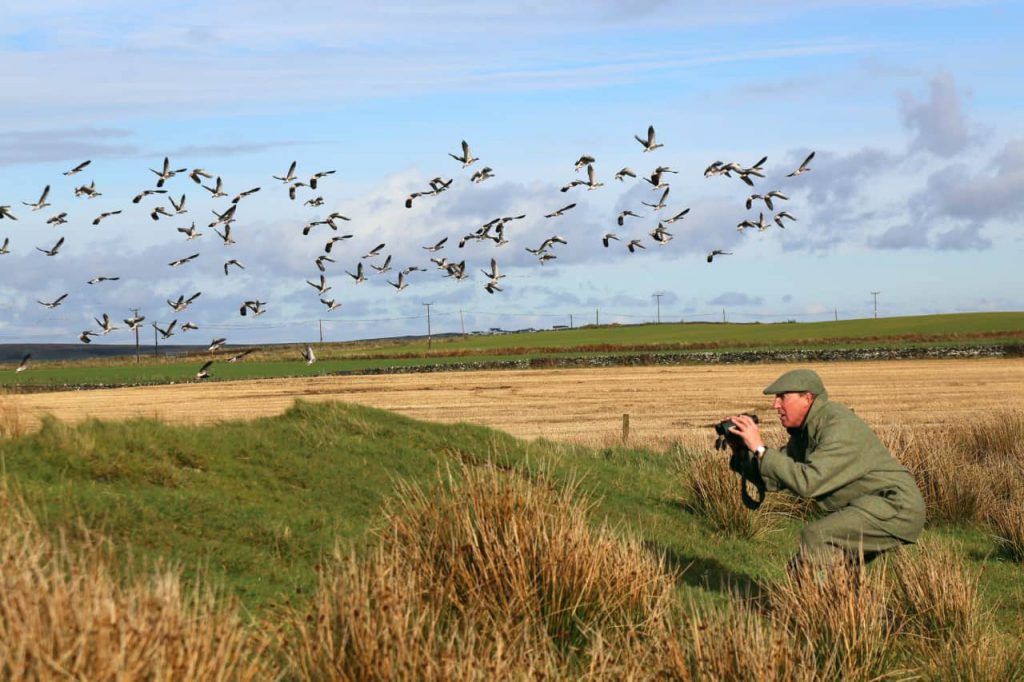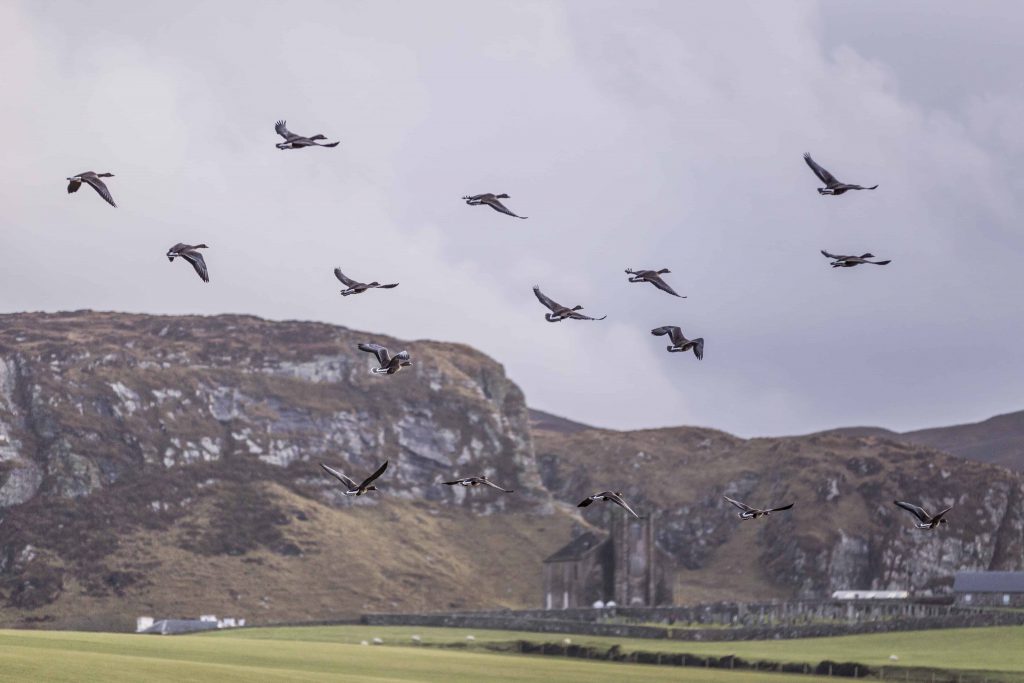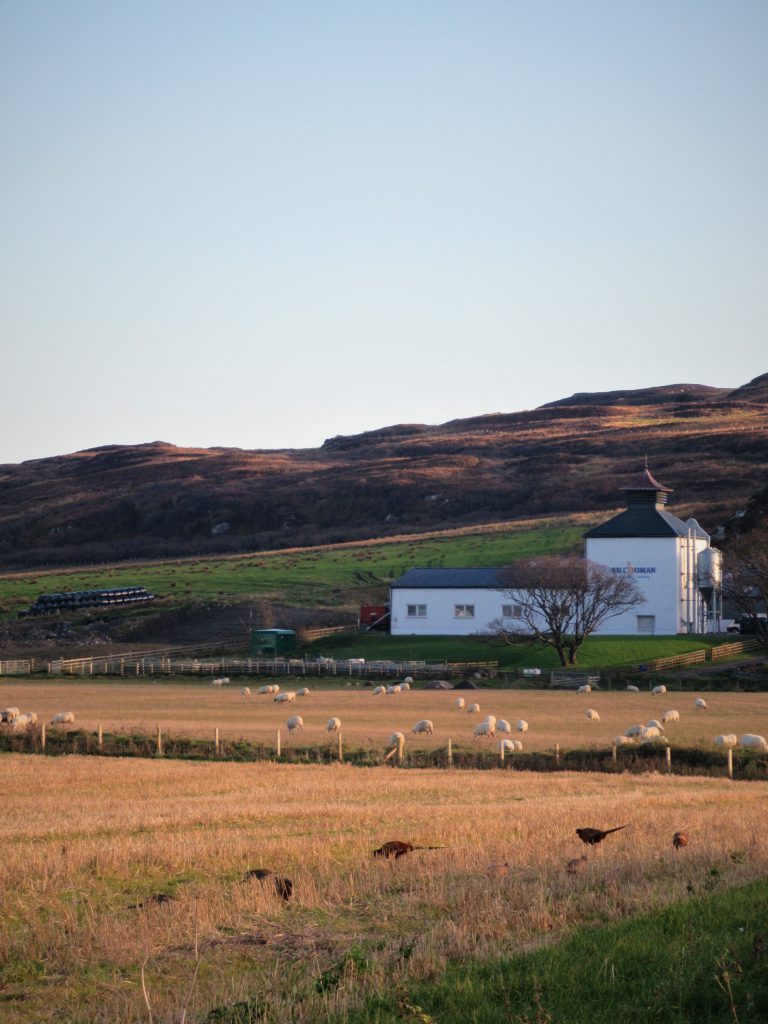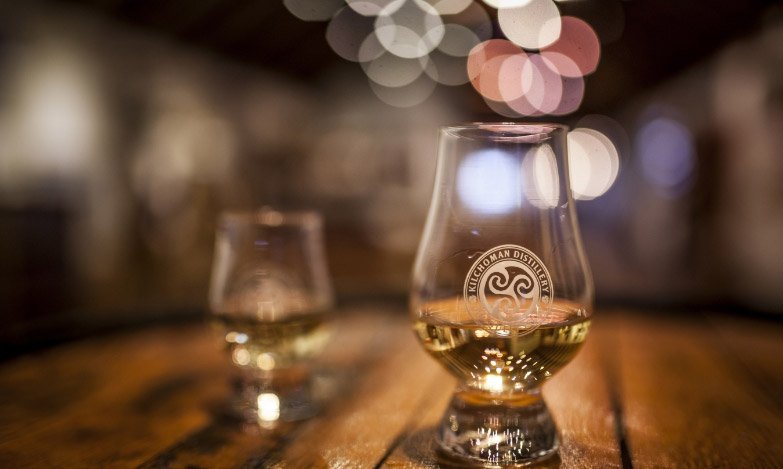BLOG POST, DISTILLERY NEWS
Kilchoman Birdlife
December 13, 2019Bird Watching with Donald James MacPhee
Donald James, or DJ as he is known as by the locals, is a true ‘Ileach’ who has lived all his life here on Islay. He was born in Port Askaig and then moved to Keills. After his school years he began working as a gamekeeper on Dunlossit Estate and continued to do so for 40 years. Wildlife has always been a big interest of DJ. His other hobbies over the years have included playing for the local rugby and football teams and taking part in various running competitions. DJ has often been spotted running all around the island. He has run great distances all over the hills and remote areas of Islay. There won’t be much of the island he hasn’t seen! He has always thrived on the community spirit of the island and has been involved in many things such as volunteering for the local lifeboat and more recently a lot of the historical projects going on throughout the island. He has always been a busy and very active man and since retiring from Dunlossit Estate he has certainly not put his feet up and started to take things easy. He and his wife Isabel are now running a bed and breakfast as well as a business called ‘Islay Outdoors’ which he describes as being more of a hobby than work. DJ has an incredible knowledge of the island, not just Islay wildlife, but also the history of the different areas. Through his Islay Outdoors ‘hobby’ he shares his knowledge and passion with others as he guides them around our beautiful island. And it’s not only the visitors that benefit from his expertise, even the locals learn a lot of new things from DJ! Recently he took Emma and Catherine out on a walk around the farm and hills surrounding the distillery to look at Kilchoman bird life.

Islay is known as the Queen of the Hebrides and our island boasts a wide variety of amazing scenery and habitats, including wild open moorland and hills, unspoilt beaches and cliffs, mixed woodland and mudflats, all of which offer amazing birding on the island all year round. As well as tourists often visiting Islay because of their interest in whisky and our distilleries, many often come to bird watch.
Lots of people sent us questions through our social media to ask Donald James. He kindly took the time to answer a few for us.

What are the most common types of birds to be spotted around the Kilchoman area?
The most common bird you’ll see on Islay at this time of year is the Barnacle goose. There are several thousands of them that will settle here at Kilchoman. There is also the Greenland white fronted goose here wintering at the moment. The ones that are here throughout the year are the peregrines. There are also the falcons, they like the cliffs at the back of Kilchoman. We have a resident pair of choughs which used to nest in the distillery, but they now have a specially built accommodation at the back of the distillery. They are the mascots of the distillery really! Choughs are very rare to spot. In the summer we have the corncrakes coming and they are very popular with the tourists. You’ll find them in the grassy fields and up near the old Kilchoman church and cemetery.
Which type of geese do you have on Islay?
The barnacle is the main one. Then the white fronts, the grey lags, and even brent geese in Loch Indaal. There are some bar headed geese and some pink footed geese that also stop over. You get different ones stopping over for a short time. Canada geese are now moving in too. They have started to nest and are now beginning to stay on Islay.
Are there different birds spotted at different times of the year?
In the winter you’ll see the migratory birds, mostly the waders such as the geese. You can also see ducks in the ponds at the end of the road, you’ll see the wigeon, the teal, the mallard. They come in quite heavily in the winter. In the spring and summer time the corncrakes will come. They are difficult to see but you’ll hear them. You also have the lapwing and some curlews for example. There are a good variety of birds on Islay. On the edges of the cliffs you can sometimes see the merlin, although they are quite rare on the island now. I have even seen the kestrel down at Machir Bay beach but not often. The kestrels are on the decline now. They are not so common as they once were. You often see swallows and barn owls nesting in the surrounding buildings. There is a good variety. Islay is rich in birdlife.
What attracts the different varieties of birds to Islay?
The climate helps. For the winter birds we don’t get too much frost so they can still feed. The ones with long beaks stick their beaks in the ground to feed. The gulf stream helps a lot. We’ve got good farming. We’ve got grass that grows practically all year round so the grazing birds, the geese especially, will eat the grass because it doesn’t freeze. Then in the summer we’ve got a good variety of habitats. The lapwings for example like the open spaces to have their young. There is plenty of long heather which the hen harriers like to nest in as it gives them good coverage. It is the variety of the habitats that really suits so many different species of birds.

(photo by Ben Shakespeare)
Are there specific parts of the island where it is more common to see particular species of birds?
Yes, there are. Once you know the lie of the land on the island there are certain spots where it is more common to see certain species. You get to know where they tend to nest. With the eagles for example you know where they tend to nest and then when they fledge out the nests, they can be spotted hanging around the area with the juveniles until they are strong enough to go further away. It is the same with the harriers, corncrake and choughs. They will nest in the same type of area every year. It is the same with the corncrake and the choughs. They are in the same areas so once you know the lie of the land, they are easier to spot. There are rules to consider particularly during the breeding seasons. You are not allowed to go too near when they are nesting. You must stay a certain distance away because it is not fair to disturb them. But nowadays with good binoculars and telescopic cameras you don’t have to try and get so close to get a good view.
Which are the rarest birds on Islay?
Corncrake, chough and now grouse are all very rare. Even eagles are quite rare to see, there’s not that many of them around. You get all the different species sprinkling in through the winter, for example, the Icelandic gulls.
What impact do the birds have on the local environment?
Geese are having a big impact as numbers have increased so much. They are having an impact on the farmers as they are pulling out the grass and eating it. Farmers are not so happy with too many geese. It is all about sustainability and what the farmers can put up with and what they can manage. Different types of geese have been coming and going over the centuries but there are so many more now. The resident grey lag geese could be the next problem for farmers, including the growing of barley. They are big birds and their numbers are building up quite dramatically on Islay and the off-lying little islands. They will have between 6 and 12 chicks and they seem to look after them very well. There are not many predators for them. The odd eagle might take one of the young, but they generally look after them very well, so their breeding numbers could rocket out of control. They stay here all year round so they will be in the barley first, before the migratory birds even get here so that could be a problem.
Have you seen any changes in the amount/types of birds coming to Islay over the years?
The numbers of geese have risen since the 70’s. They have stopped hunting them here now, they are protected now so that has contributed to numbers increasing. The grouse numbers have gone down. You used to see a lot of red grouse. There would’ve been hundreds if not thousands on the island but now there is just a handful of them left. They think a disease got into their eggs or their bodies in the early 70s and it was killing them. The last black grouse I saw was on Jura. Also, the number of sea eagles has increased. I think they were introduced into the Isle of Rum in 1976 from Norway and they have spread down to Mull and now Islay and they are now often seen on Islay.
When is the best time of year to visit Islay for bird watching?
Quite a lot of professional bird watchers want to see the migratory birds when they are coming in or going out. They want to catch any oddities that might be among the migratory birds. Any that have maybe blown off course or got mixed up. Any time of the year really is a good time to see birds on Islay. Some species are here all the time, for example, the eagles and the harriers, they are here all year round. People come throughout the year for different reasons. Some people don’t come just for the bird watching, they might combine it with other things such as distillery visits or walking.
What are your favourite birds and why?
I like a lot of different birds for different reasons. I like the peregrine because it is such an iconic bird. It is the fastest bird on the stoop, it can get up to 175 mph! I like it because it is muscular and powerful. I like the Golden Eagle more than the Sea Eagle. The sea eagle never looks so pretty, it always looks a bit sloppy when it’s flying. Whereas the golden eagle is more graceful. The sea eagle almost looks like it is having a bad hair day, or a bad feather day! Their feathers are always a bit out of place. I really love the woodcock as a game bird, it is a lovely bird to see flying. I also like snipe and grouse. Being brought up as a gamekeeper you like different birds for different reasons. The lapwing is a lovely bird to look at, the wee tuft on its head. All the smaller birds are lovely when you see them up close. I love the skylark. I think it is the nicest sounding bird. Normally when you are cutting peats it is the only sound you can hear. I like the gannet because it is such a good fisherman. It is hunting all the time. They have different styles of fishing. The heron for example will stand for ages and ages, waiting until it gets something. The gannet obviously comes in from a great height. I like the osprey. We have one or two here. I don’t think they are nesting on the island, but they are migrating through Islay and starting to stay a bit longer. All birds have their own niceties in their own way.

Thank you to DJ for taking the time to answer these questions for us. He is a very interesting man to talk to. If you are on Islay and would like to learn more about the history or wildlife on the island, you should spend some time with DJ. Click on the link below to visit his website for more information.
READ NEXT
BLOG POST,DISTILLERY NEWS
Machir Bay Cask Strength 2025
Three years since our last Machir Bay Cask Strength release, the 2025 edition is here, and it delivers in every sense. “One of my favourite whiskies we have released, it has everything I love about Kilchoman spirit, with a little extra punch. There will be a lot of happy Kilchoman…
November 4, 2025

